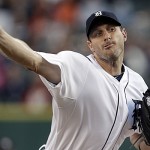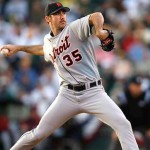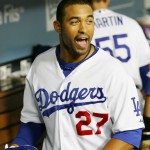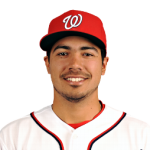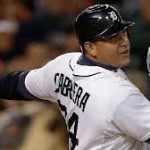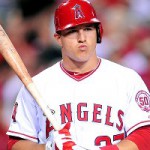In January, after most of marquee FA signings had shaken out, I ranked the 2013 rotations of teams 1-30. I was excited about the Nats rotation, speculated more than once that we had the best rotation in the league, and wanted to make a case for it by stacking up the teams 1-30.
I thought it’d be an interesting exercise to revisit my rankings now that the season is over with a hindsight view, doing some post-mortem analysis and tacking on some advanced metrics to try to quantify who really performed the best this season. For advanced metrics I’m leaning heavily on Fangraphs team starter stats page, whose Dashboard view quickly gives the team ERA, FIP, xFIP, WAR, SIERA, K/9 and other key stats that I’ll use in this posting.
- (#2 pre-season) Detroit: Verlander, Fister, Sanchez, Scherzer, Porcello (with Alvarez providing some cover). Scherzer likely wins the Cy Young. Three guys with 200+ strikeouts. The league leader in ERA. And we havn’t even mentioned Justin Verlander yet. A team starting pitching fWAR of 25.3, which dwarfed the next closest competitor. There’s no question; we knew Detroit’s rotation was going to be good, but not this good. Here’s a scary fact; their rotation BABIP was .307, so in reality this group should have done even better than they actually did. Detroit’s rotation was *easily* the best rotation in the league and all 6 of these guys return for 2014.
- (#3 Preseason): Los Angeles Dodgers: Kershaw, Greinke, Ryu, Nolasco, and Capuano (with Fife, Beckett, Lilly, Billingsley and a few others helping out); The 1-2 punch of Kershaw (the NL’s clear Cy Young favorite) and Greinke (who quietly went 15-4) was augmented by the stand-out rookie performance of Ryu, the surprisingly good half-season worth of starts from Nolasco, and then the all-hands-on deck approach for the rest of the starts. This team used 11 different starters on the year thanks to injury and ineffectiveness, but still posted the 2nd best team FIP and 5th best fWAR in the league.
- (#8 pre-season): St. Louis: Wainwright, Lynn, Miller, Wacha and Kelly (with Garcia, Westbrook, and a few others pitching in). Team leader Chris Carpenter missed the whole season and this team still was one of the best rotations in the league. Westbrook missed time, Garcia only gave them 9 starts. That’s the team’s planned #1, #3 and #4 starters. What happened? They call up Miller and he’s fantastic. They call up Wacha and he nearly pitches back to back no-hitters at the end of the season. They give Kelly a starting nod out of the bullpen and he delivers with a better ERA+ than any of them from the #5 spot. St. Louis remains the bearer-standard of pitching development (along with Tampa and Oakland to an extent) in the game.
- (#22 pre-season): Pittsburgh: Liriano, Burnett, Locke, Cole, Morton (with Rodriguez and a slew of call-ups helping out). How did this team, which I thought was so low pre-season, turn out to have the 4th best starter FIP in the game? Francisco Liriano had a renessaince season, Burnett continued to make Yankees fans shake their heads, and their top 6 starters (by number of starts) all maintained sub 4.00 ERAs. Gerrit Cole has turned out to be the real deal and will be a force in this league.
- (#1 pre-season) Washington: Strasburg, Gonzalez, Zimmermann, Haren, Detwiler with Jordan, Roark and other starts thrown to Karns and Ohlendorf). Despite Haren’s continued attempts to sabotage this rotation’s mojo, they still finished 3rd in xFIP and 5th in FIP. Haren’s 11-19 team record and substandard ERA/FIP values drug this group down, but there wasn’t much further up they could have gone on this list. If you had replaced Haren with a full season of Jordan’s production, maybe this team jumps up a little bit, but the teams above them are tough to beat.
- (#11 pre-season) Atlanta: Hudson, Medlen, Minor, Teheran and Maholm, (with rookie Alex Wood contributing towards the end of the season). Brandon Beachy only gave them 5 starts; had he replaced Maholm this rotation could have done better. Hudson went down with an awful looking injury but was ably covered for by Wood. They head into 2014 with a relatively formidable and cheap potential rotation of Medlen, Minor, Teheran, Beachy and Wood, assuming they don’t resign Hudson. How did they over-perform? Teheran finally figured it out, Maholm was more than servicable the first couple months, Wood was great and came out of nowhere.
- (#26 pre-season) Cleveland: Jimenez, Masterson, McAllister, Kluber, Kazmir. Too high for this group? 7th in rotation fWAR, 8th in FIP, and 6th in xFIP. This group, which I thought was going to be among the worst in the league, turned out to be one of the best. Jimenez and Masterson both had rebound years with a ton of Ks, and the rest of this crew pitches well enough to remain around league average. They were 2nd best in the league in K/9. You can make the argument that they benefitted from the weakened AL Central, but they still made the playoffs with a relative rag-tag bunch.
- (#9 pre-season) Cincinnati: Cueto, Latos, Bailey, Arroyo, Leake (with Tony Cingrani). Cueto was good … but he was never healthy, hitting the D/L three separate times. Luckily Cingrani came up from setting strikeout records in AAA and kept mowing them down in the majors. Latos was dominant, Leake took a step forward, and Bailey/Arroyo gave what they normally do. If anything you would have thought this group would have been better. 6th in Wins, 7th in xFIP, 9th in FIP. Next year Arroyo leaves, Cingrani gets 32 starts, Cueto stays healthy (cross your fingers, cross your fingers, cross your fingers) and this team is dominant again despite their FA hitting losses.
- (#25 pre-season) New York Mets: Harvey, Wheeler, Niese, Gee, Hefner and a bunch of effective call-ups turned the Mets into a halfway-decent rotation all in all. 7th in xFIP, 11th in FIP. Most of this is on the backs of Matt Harvey, who pitched like the second coming of Walter Johnson for most of the season. Wheeler was more than effective, and rotation workhorses Niese and Gee may not be sexy names, but they were hovering right around the 100 ERA+ mark all year. One superstar plus 4 league average guys was good enough for the 9th best rotation.
- (#12 pre-season) Texas: Darvish, Holland, Ogando, Perez, Garza at the end. Texas’ fWAR was the 2nd best in the league … but their accompanying stats drag them down this far. Despite having four starters with ERA+s ranging from 114 to Darvish’ 145, the 34 starts given to Tepesch and Grimm drag this rotation down. Ogando couldn’t stay healthy and Perez only gave them 20 starts. Garza was mostly a bust. And presumed #2 starter Matt Harrison gave them just 2 starts. But look out for this group in 2014; Darvish, a healthy Harrison, and Holland all locked up long term, Ogando in his first arbitration year, and Perez is just 22. That’s a formidable group if they can stay on the field together.
- (pre-season #6) Tampa Bay: Price, Moore, Hellickson, Cobb, Archer and Roberto Hernandez. Jeff Niemann didn’t give them a 2013 start, but no matter, the Tampa Bay gravy train of power pitchers kept on producing. Cobb was unhittable, Archer was effective and Moore regained his 2011 playoff mojo to finish 17-4 on the year. An odd regression from Price, which was fixed by a quick D/L trip, and a complete collapse of Hellickson drug down this rotation from where it should have been. They still finished 12th in FIP and xFIP for the year.
- (pre-season #21) Seattle: Hernandez, Iwakuma, Saunders, Harang, Maurer, and Ramirez. Seattle featured two excellent, ace-leve performers and a bunch of guys who pitched worse than Dan Haren all year. But combined together and you have about the 12th best rotation, believe it or not.
- (pre-season #7) Philadelphia: Halladay, Hamels, Lee, Kendrick, Lannan (with Cloyd and Pettibone as backups). The phillies were 13th in xFIP, 10th in FIP on the year and regressed slightly thanks to the significant demise to their #1 guy Halladay. Lee pitched like his typical Ace but Hamels self-destructed as well. The strength of one excellent starter makes this a mid-ranked rotation. Had Halladay and Hamels pitched like expected, they’d have finished closer to my pre-season ranking.
- (pre-season #17) Boston: Lester, Buchholz, Dempster, Lackey, Doubront, and Peavy: Boston got a surprise bounce back season out of Lackey, a fantastic if oft-injured performance from Buchholz, a mid-season trade for the effective Peavy. Why aren’t they higher? Because their home stadium contributes to their high ERAs in general. Despite being 3rd in rotation fWAR and 4th in wins, this group was 17th in FIP and 18th in xFIP. Perhaps you could argue they belong a couple places higher, but everyone knows its Boston’s offense that is driving their success this year.
- (pre-season #16) New York Yankees: Sabathia, Kuroda, Pettitte, Nova, Hughes/Phelps. Hughes and Phelps pitched as predictably bad as you would have expected … but Sabathia’s downturn was unexpected. Are his years of being a workhorse catching up to him? The rotation was buoyed by unexpectedly good seasons from Nova and Kuroda. Pettitte’s swang song was pretty great, considering his age. Enough for them to slightly beat expectations, but the signs of trouble are here for this rotation in the future. Pettitee retired, Kuroda a FA, Hughes a FA, a lost season for prospect Michael Pineda and other Yankees prospects stalled. Are we in for a dark period in the Bronx?
- (pre-season #29) Miami: Fernandez, Nolasco, Eovaldi, Turner, Alvarez, Koehler and a few other starts given to either re-treads or MLFAs. For Miami’s rotation of kids to rise this far up is amazing; looking at their stellar stats you would think they should have been higher ranked still. Fernandez’s amazing 176 ERA+ should win him the Rookie of the Year. Eovaldi improved, rookie Turner pitched pretty well for a 22 year old. The team dumped its opening day starter Nolasco and kept on … losing frankly, because the offense was so durn bad. Begrudgingly it looks like Jeffry Loria has found himself another slew of great arms to build on.
- (pre-season #5) San Francisco: Cain, Lincecum, Bumgarner, Vogelsong, Zito, Gaudin. What the heck happened here? Cain went from an Ace to pitching like a 5th starter, Lincecum continued to completely forget what it was like to pitch like a Cy Young winner, Vogelsong completely fell off his fairy-tale cliff, and Zito completed his $126M journey in typical 5+ ERA fashion. I’m surprised these guys are ranked this high (14th in FIP, 16th in xFIP but just 27th in fWAR thanks to just horrible performances all year). What the heck are they going to do in 2014?
- (pre-season #10) Arizona: Corbin, Kennedy, McCarthy, Cahill, Miley and Delgado. Corbin was 2013’s version of Miley; a rookie that came out of nowhere to lead the staff. Miley struggled at times but righted the ship and pitched decently enough. The rest of the staff really struggled. I thought this was a solid bunch but they ended up ranked 23rd in FIP and 14th in xFIP, indicating that they were a bit unlucky as a group.
- (pre-season #15) Chicago White Sox: Sale, Peavy, Danks, Quintana, Santiago and Axelrod. Floyd went down early, Peavy was traded. Sale pitched well but had a losing record. The team looked good on paper (16th in ERA) but were 26th in FIP and 17th in xFIP.
- (pre-season #14) Oakland: Colon, Anderson, Griffen, Parker, Straily, Milone, with Sonny Gray giving 10 good starts down the stretch. This rotation is the story of one amazing 40-yr old and a bunch of kids who I thought were going to be better. Oakland is bashing their way to success this season and this group has been just good enough to keep them going. I thought the likes of Griffen and Parker would have been better this year, hence their falling from #14 to #19.
- (pre-season #19) Chicago Cubs: Garza, Samardzija, Jackson, Wood, and Feldman: Feldman and Garza were flipped once they showed they could be good this year. Samardzija took an uncharacteristic step backwards. Jackson was awful. The Cubs ended up right about where we thought they’d be. However in 2014 they look to be much lower unless some big-armed prospects make the team.
- (pre-season #20) Kansas City: Shields, Guthrie, Santana, Davis, Chen, Mendoza: despite trading the best prospect in the game to acquire Shields and Davis, the Royals a) did not make the playoffs and b) really didn’t have that impressive a rotation. 12th in team ERA but 20th in FIP and 25th in xFIP. Compare that to their rankings of 25th in FIP and 26th in xFIP in 2012. But the results on the field are inarguable; the team improved 14 games in the Win column and should be a good bet to make the playoffs next year if they can replace the possibly-departing Santana and the ineffective Davis.
- (pre-season #23) Milwaukee: Lohse, Gallardo, Estrada, Peralta, and dozens of starts given to long-men and call-ups. I ranked this squad #23 pre-season before they acquired Lohse; in reality despite his pay and the lost draft pick, Lohse’s addition ended up … having almost no impact on this team in 2013. They finished ranked 23rd on my list, and the team was 74-88.
- (pre-season #13): Los Angeles Angels: Weaver, Wilson, Vargas, Hanson, Blanton, Williams: The Angels are in a predicament; their two “aces” Weaver and Wilson both pitched well enough. But nobody in baseball was really that surprised by the god-awful performances from Hanson or Blanton (2-14, 6.04 ERA … and the Angels gave him a two year deal!). So in some ways the team brought this on themselves. You spend half a billion dollars on aging offensive FAs, have the best player in the game languishing in left field because your manager stubbornly thinks that someone else is better in center than one of the best defenders in the game … not fun times in Anaheim. To make matters worse, your bigtime Ace Weaver missed a bunch of starts, looked mortal, and lost velocity.
- (#28 pre-season) San Diego: Volquez, Richards, Marquis, Stults, Ross, Cashner: have you ever seen an opening day starter post a 6+ ERA in a cave of a field and get relased before the season was over? That happened to SAn Diego this year. Another case where ERA+ values are deceiving; Stults posted a sub 4.00 ERA but his ERA+ was just 87, thanks to his home ballpark. In fact its almost impossible to tell just how good or bad San Diego pitchers are. I could be talked in to putting them this high or all the way down to about #28 in the rankings.
- (pre-season #27) Colorado: Chatwood, De La Rosa, Chacin, Nicaso, Francis and a few starts for Garland and Oswalt for good measure. Another staff who shows how deceptive the ERA+ value can be. Their top guys posted 125 ERA+ figures but as a whole their staff performed badly. 26th in ERA, 19th in FIP, 26th in xFIP. Colorado is like Minnesota; they just don’t have guys who can throw it by you (29th in K/9 just ahead of the Twins), and in their ridiculous hitter’s park, that spells trouble.
- (pre-season #4) Toronto: Dickey, Morrow, Johnson, Buehrle, Happ, Rogers, and a line of other guys. What happened here? This was supposed to be one of the best rotations in the majors. Instead they fell on their face, suffered a ton of injuries (only Dickey and Buehrle pitched full seasons: Romero, Drabeck were hurt. Johnson, Happ, Redmond only 14-16 starts each. This team even gave starts to Chien-Ming Wang and Ramon Ortiz. Why not call up Fernando Valenzuela out of retirement? It just goes to show; the best teams on paper sometimes don’t come together. The Nats disappointed in 2013, but probably not as much as the Blue Jays.
- (pre-season #18) Baltimore: Hammel, Chen, Tillman, Gonzalez, Feldman, Garcia with a few starts given to Gausman and Britton. I’m not sure why I thought this group would be better than this; they were in the bottom four of the league in ERA, FIP, xFIP and SIERA. It just goes to show how the ERA+ value can be misleading. In their defense, they do pitch in a hitter’s park. Tillman wasn’t bad, Chen took a step back. The big concern here is the health of Dylan Bundy, who I thought could have pitched in the majors starting in June.
- (pre-season #30) Houston: Bedard, Norris, Humber, Peacock, Harrell to start, then a parade of youngsters from there. We knew Houston was going to be bad. But amazingly their rotation wasn’t the worst in the league, thanks to Jarred Cosart and Brett Olberholtzer coming up and pitching lights-out for 10 starts a piece later in the year. There’s some potential talent here.
- (pre-season #24) Minnesota: Diamond, Pelfrey, Correia, Denudo, Worley and a whole slew of guys who were equally as bad. Minnesota had the worst rotation in the league, and it wasn’t close. They were dead last in rotational ERA, FIP, and xFIP, and it wasn’t close. They were last in K/9 … by more than a strikeout per game. They got a total fWAR of 4.6 from every pitcher who started a game for them this year. Matt Harvey had a 6.1 fWAR in just 26 starts before he got hurt. Someone needs to call the Twins GM and tell him that its not the year 1920, that power-pitching is the wave of the future, that you need swing-and-miss guys to win games in this league.
Biggest Surprises: Pittsburgh, Cleveland, Miami and New York Mets to a certain extent.
Biggest Disappointments: Toronto, the Angels, San Francisco, Philadelphia and Baltimore to some extent.
Disagree with these rankings? Feel free to pipe up. I’ll use this ranking list as the spring board post-FA market for 2014’s pre-season rankings.
